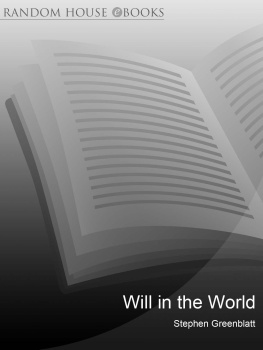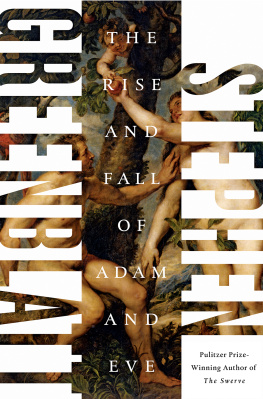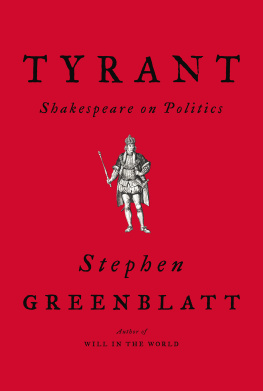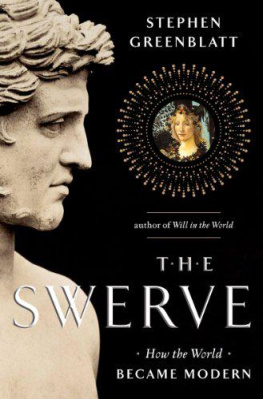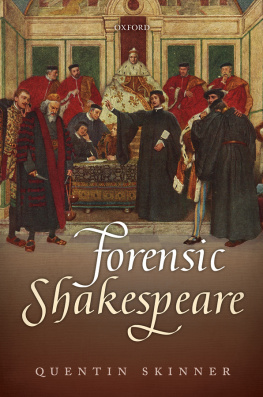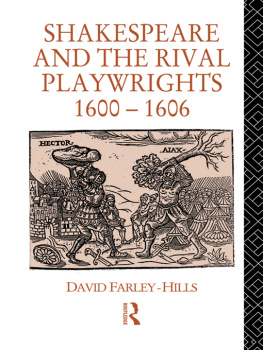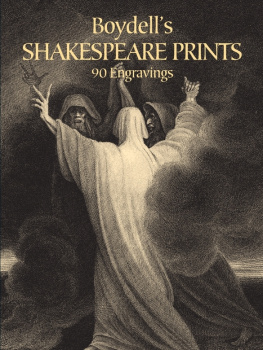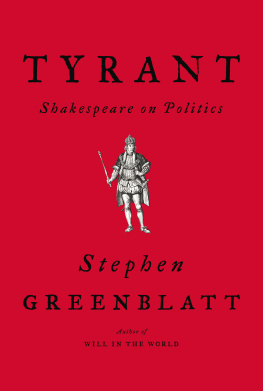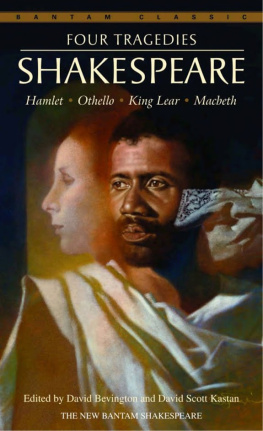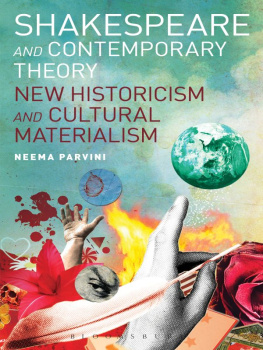Contents
Acknowledgments
IT IS A TOKEN of the special delight Shakespeare bestows on everything that even the many debts I have incurred in writing this book give me deep pleasure to acknowledge. My remarkably gifted colleagues and students at Harvard University have been an unfailing source of intellectual stimulation and challenge, and the universitys fabled resourcesabove all, its celebrated libraries and their accomplished staffhave enabled me to pursue even the most arcane questions. The Mellon Foundation gave me the precious gift of time, and the Wissenschaftskolleg zu Berlin provided the perfect setting to complete the writing of this book. I am grateful for the opportunities I had to try out my ideas at the Shakespeare Association of America, the Bath Shakespeare Festival, New York University, the Lionel Trilling Seminar at Columbia University, the Leo Lowenthal Memorial Conference, Boston College, Wellesley College, Hendrix College, the Einstein Forum, and, on multiple occasions, Marlboro College and the Marlboro Music Festival.
The idea of Will in the World originated years ago during conversations I had with Marc Norman, who was then in the early stages of writing a film script about Shakespeares life. The script was the germ of a celebrated movie, Shakespeare in Love, but my own project lay dormant until my wife, Ramie Targoff, gave me the sustained encouragement, intellectual and emotional, to pursue it. Crucial advice and assistance came from Jill Kneerim, and my friends Homi Bhabha, Jeffrey Knapp, Joseph Koerner, Charles Mee, and Robert Pinsky each gave me more of their time, learning, and wisdom than I can ever hope to repay. I have benefited too from the help and probing questions of many other friends, including Marcella Anderson, Leonard Barkan, Frank Bidart, Robert Brustein, Thomas Laqueur, Adam Phillips, Regula Rapp, Moshe Safdie, James Shapiro, Debora Shuger, and the late Bernard Williams. Beatrice Kitzinger, Emily Peterson, Kate Pilson, Holger Schott, Gustavo Secchi, and Phillip Schwyzer have been tireless and resourceful assistants. With exemplary patience and insight, my editor, Alane Mason, continued to work on the manuscript of my book through the course of her pregnancy, and, by something of a miracle, she somehow managed to finish on her due date.
My deepest and most richly pleasurable debts are closest to home: to my wife and my three sons, Josh, Aaron, and Harry. Only the youngest, by virtue of being a toddler, has been spared endless conversations about Shakespeare and has not directly contributed his ideas. But Harry, who came into the world 104 years after the birth of his namesake, my father, has taught me how breathtakingly close we are to lives that at first sight seem so far away.
About the Author
Stephen Greenblatt is the John Cogan University Professor of the Humanities at Harvard University and is the founder of the school of literary criticism known as New Historicism. As visiting professor and lecturer at universities in England, Australia, the United States and elsewhere throughout the world, he has delivered such distinguished series of lectures as the Clarendon Lectures at Oxford and the University Public Lectures at Princeton. He has received two Guggenheim Fellowships and has been President of the Modern Language Association. Professor Greenblatt is the author and co-author of nine books and the editor of ten others, including The Norton Anthology of English Literature (7th edition) and The Norton Shakespeare.
ALSO BY STEPHEN GREENBLATT
Hamlet in Purgatory
Practicing New Historicism (with Catherine Gallagher)
Marvelous Possessions: The Wonder of the New World
Learning to Curse: Essays in Early Modern Culture
Shakespearean Negotiations:
The Circulation of Social Energy in Renaissance England
Renaissance Self-Fashioning: From More to Shakespeare
Sir Walter Ralegh: The Renaissance Man and His Roles
Three Modern Satirists: Waugh, Orwell, and Huxley
EDITED BY STEPHEN GREENBLATT
The Norton Anthology of English Literature (general editor)
The Norton Shakespeare (general editor)
New World Encounters
Redrawing the Boundaries:
The Transformation of English and American Literary Studies
Representing the English Renaissance
Allegory and Representation
Bibliographical Notes
ALL BIOGRAPHICAL STUDIES of Shakespeare necessarily build on the assiduous, sometimes obsessive archival research and speculation of many generations of scholars and writers. The long history of this enterprise is the subject of Samuel Schoenbaums Shakespeares Lives (New York: Oxford University Press, 1970) and Gary Taylors Reinventing Shakespeare: A Cultural History from the Restoration to the Present (New York: Weidenfeld and Nicolson, 1989). Schoenbaum delights in chronicling the mythmaking extravagances and absurdities of Shakespeare biography, but there is at least as much to admire as to ridicule.
I have profited greatly not only from recent research, which has painstakingly winkled out some intriguing new details about the playwrights life and times, but also from nineteenth- and early-twentieth-century studies. These studies came under fierce attack from C. J. Sisson in 1934 in an influential essay, The Mythical Sorrows of Shakespeare (in Studies in Shakespeare: British Academy Lectures, ed. Peter Alexander [London: Oxford University Press, 1964], 932), but recent scholarship, including Marjorie Garbers Shakespeares Ghost Writers: Literature as Uncanny Causality (New York: Methuen, 1987), Leah Marcuss Puzzling Shakespeare: Local Reading and Its Discontents (Berkeley: University of California Press, 1988), and Richard Wilsons Will Power: Essays on Shakespearean Authority (Detroit: Wayne State University Press, 1993), has reassessed their significance and usefulness. Foremost among them is J. O. Halliwell-Phillippss two-volume Outlines of the Life of Shakespeare, 10th ed. (London: Longmans, 1898). Also useful and suggestive are Edward Dowden, Shakspere: A Critical Study of His Mind and Art (London: Henry King, 1876); Frederick Fleay, A Chronicle History of the Life and Work of William Shakespeare, Player, Poet, and Playmaker (London: Nimmo, 1886); Sidney Lee, A Life of William Shakespeare (New York: Macmillan, 1898); George Brandes, William Shakespeare: A Critical Study (New York: Frederick Unger, 1898); Charles Elton, William Shakespeare, His Family and Friends (London: John Murray, 1904); Charlotte Stopes, Shakespeares Warwickshire Contemporaries (Stratford-upon-Avon: Shakespeare Head Press, 1907); and David Masson, Shakespeare Personally (London: Smith, Elder, 1914). Edgar Fripps two-volume Shakespeare, Man and Artist (London: Oxford University Press, 1938) is a chaotic treasure trove of valuable information, which I have repeatedly mined.
Among more recent biographies, the most thorough, informative, and steadily thoughtful is Park Honans Shakespeare: A Life (Oxford: Oxford University Press, 1998), which I have frequently consulted. Jonathan Bates fine collection of essays, The Genius of Shakespeare (London: Picador, 1997), contains important biographical insights, as does Katherine Duncan-Joness Ungentle Shakespeare: Scenes from His Life (London: Arden Shakespeare, 2001). Among the other biographical studies upon which I have drawn are Marchette Chutes lively Shakespeare of London (New York: Dutton, 1949); M. M. Reeses Shakespeare: His World and His Work
Next page
